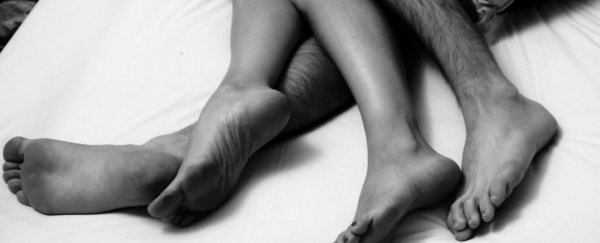Heart patients have worried that they may die suddenly from sex, but a new study suggests they probably won't.
Researchers found that less than 1 percent of people who experienced sudden cardiac arrest were having, or just had, sex. Now Sumeet Chugh, one of the study's authors, has some "happy news" to tell his nervous patients.
"As a cardiologist, from time to time, in an awkward way, patients would ask me 'you know doc, what's my risk of dying suddenly with sexual activity?' We could say to them 'it's probably low,' but we never had data," Chugh said.
"Now we have data to answer that question."
Researchers described sudden cardiac arrest as a "mostly lethal condition," that manifests as "an unexpected collapse and loss of the pulse."
More than 300,000 people die annually in the United States from sudden cardiac arrest, yet about 1 in 100 men and 1 in 1,000 women experience sudden cardiac arrest relating to sexual activity, according to the study which was presented at the American Heart Association's Scientific Sessions and published in the Journal of the American College of Cardiology.
The community-based Oregon Sudden Unexpected Death Study examined data on more than 4,500 sudden cardiac arrests in the Portland, Oregon, metropolitan area from 2002 to 2015. Of those, 34 were related to sex, and most were men with a history of heart diseases.
Researchers collected medical records, autopsy data and details of what the person was doing when the sudden cardiac arrest happened. Any cases that occurred during sex or within one hour were considered related to sexual activity.
Sudden cardiac arrest occurred during sexual activity in 18 cases and within minutes of it in 15 cases. In one case, the timing could not be determined.
"We were pleasantly surprised to see how low it was," said Chugh, the associate director of the Heart Institute for Genomic Cardiology at Cedars-Sinai in Los Angeles.
This study is an opportunity to reassure patients that they can return to a good quality of life, including sexual activity, said Dr. Nieca Goldberg, who is the medical director for the Joan H. Tisch Center for Women's Health at New York University. She is also an AHA spokeswoman and was not involved with the study.
"These are real concerns of our patients," she said. "We have so many tools to prolong people's lives, we want them to have a good quality of life, returning to exercise, eating a healthy diet and returning to sexual activity."
The study also shows that sex "obviously isn't as strenuous as we thought," Chugh said, and Goldberg agreed. Sex, in general, is equivalent to walking up two flights of stairs, she said.
But a concerning result of the study, Chugh and Goldberg noted, is that it seems to suggests that sexual partners aren't very willing to perform CPR, or don't know how, if a partner goes into sudden cardiac arrest.
Within 10 minutes of a sudden cardiac arrest, a person is likely to die, and only one-third of the people who experienced sudden cardiac arrest relating to sexual activity received bystander CPR, according to the study.
"We would think that if the witness is right there everybody would get CPR," Chugh said. "But it turns out only a third of the subjects got CPR and since most of the subjects were men it seems like two thirds of the women really didn't do the CPR."
"It's a good idea to be aware of CPR, know how to do CPR, and do CPR even if it's as awkward and difficult a scenario as cardiac arrest during sexual activity," Chugh said.
On average, those who went into sudden cardiac arrest relating to sexual activity were five years younger and more likely to be African American than the rest of the cases, the study states. Sudden cardiac arrest in relation to sexual activity was also more likely to have ventricular fibrillation, which is when the heart pumps little to no blood, according to the study.
It's unclear how exhausting the sexual activity was for the patients, as researchers did not examine how often they had sex, the type of intercourse, or how long it lasted. Regardless, the results show that there isn't a high risk associated with sex and sudden cardiac arrest, Chugh said.
"Obviously," Chugh said, "it isn't such a big deal."
2017 © The Washington Post
This article was originally published by The Washington Post.
